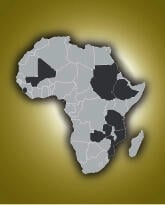Reinhart and Rogoff are looking at historical evidence of defaults and make a strong case about what prerequisites will allow for a crisis to precipitate. Right now, Greece, Spain, Portugal, and Ireland are in the most precipitous situation and stand ready to create a replay of the crisis that followed in the wake of German default in the late 20s.
Is this a stretch? I don’t think so.
Zimbabwe, Argentina, and others went bust either singly or as part of a regional financial crisis. We’re looking today at a global situation, with much more going on in more countries than in any other crisis since 1927-1933. Look at Spain’s recent election results: the Socialists that advocated austerity were swept aside in favor of populist parties. Greece isn’t likely to accept a surrender of fiscal independence to a band of German bankers, so look for a political trump there of any possible economic solution involving staying in the Euro with austerity. Italy’s and Belgium’s debt outlooks have both been lowered, and Italy is one of the G7/G8 nations: they’re a whale to the minnow of Greece.
The outcome of a crisis is never certain: one only knows that a crisis will precipitate an outcome that is in many ways significantly different from the set of conditions that existed prior to the crisis. While hindsight is also clearer than what people see at the time events are happening, it’s also insulting to those that experienced the events. By that, I mean we need to take a look at how people react in the midst of a crisis and what causes them to realize what will happen down the road. What danger signs do people consider? What events do they consider significant?
In Nazi Germany at the time of WW2, roughly half the Jews there had fled, while roughly half remained. While there were likely many Jews that could not afford to travel, there were those who could afford to do so that felt things would be all right in the long run. For those who fled, different things acted as triggers to their decision to depart. As the events became more obvious, escape became more difficult to accomplish, but remained possible. From a man who wrote “Mein Kampf” leading a coalition government to the Reichstag fire to the Enabling Act to Kristallnacht to the Nuremberg Laws to Rhineland occupation to Anschluss to Sudetenland to the Danzig crisis, events mounted in seriousness and yet war and its consequences still came as a surprise to many observers. Such will happen again in the current crisis.
This is not to say that we’re going to see, specifically, Nazism, World War, and a Holocaust. But I do believe we will see more political extremism and populism, increased tensions that will lead to more conflicts, increased opportunities for small nations to wage war as the bigger nations are preoccupied with internal troubles, and increased opportunities for ethnic-based conflict as the peacekeepers turn inward. We’re already witnessing the various Arab states dealing with their outbreaks of democracy in their own ways, and none of them are finished with their internal turmoil.
A huge question mark in my mind is China. It recently had to declare martial law in Inner Mongolia, adding that region to its list of ethnic hotspots. Couple that with increasing unemployment and inflation, and the necessary preconditions exist for a potential violent regime change in China – political infighting within the CPC at the very least and open warlordism with a breakdown of central authority as a real possibility.
Now back to Europe. 45% of Spain’s under-25s are unemployed. Massive anti-government protests have happened across the nation. This is on the level of what took place in Tunisia and elsewhere, this time in Europe. Greece had similar protests, and those are sure to worsen as the economy there worsens. Italy could be next. On the strategic side, the Visegrad nations of Poland, Hungary, Czech Republic, and Slovakia have agreed to form a battlegroup under Polish command. This is significant because they would not feel compelled to do so if both Russian power were not on the ascendant and protection guarantees from NATO were credible. The Visegrad nations are seeking to extend their alliance to Romania and Bulgaria, to formalize a vision of Pilsudski’s to create an “intermarium” alliance between nations that were traditionally in the orbit of either Russia or Germany, or both.
When was the sign that got me thinking along these lines? When Russia invaded Georgia in 2008 and the rich world watched on, impotently.
 Emergent promises a great return on their African funds. The Oakland Institute would like you to know that, yes, the great returns exist, but that you might not like the way in which the returns are attained.
Emergent promises a great return on their African funds. The Oakland Institute would like you to know that, yes, the great returns exist, but that you might not like the way in which the returns are attained.